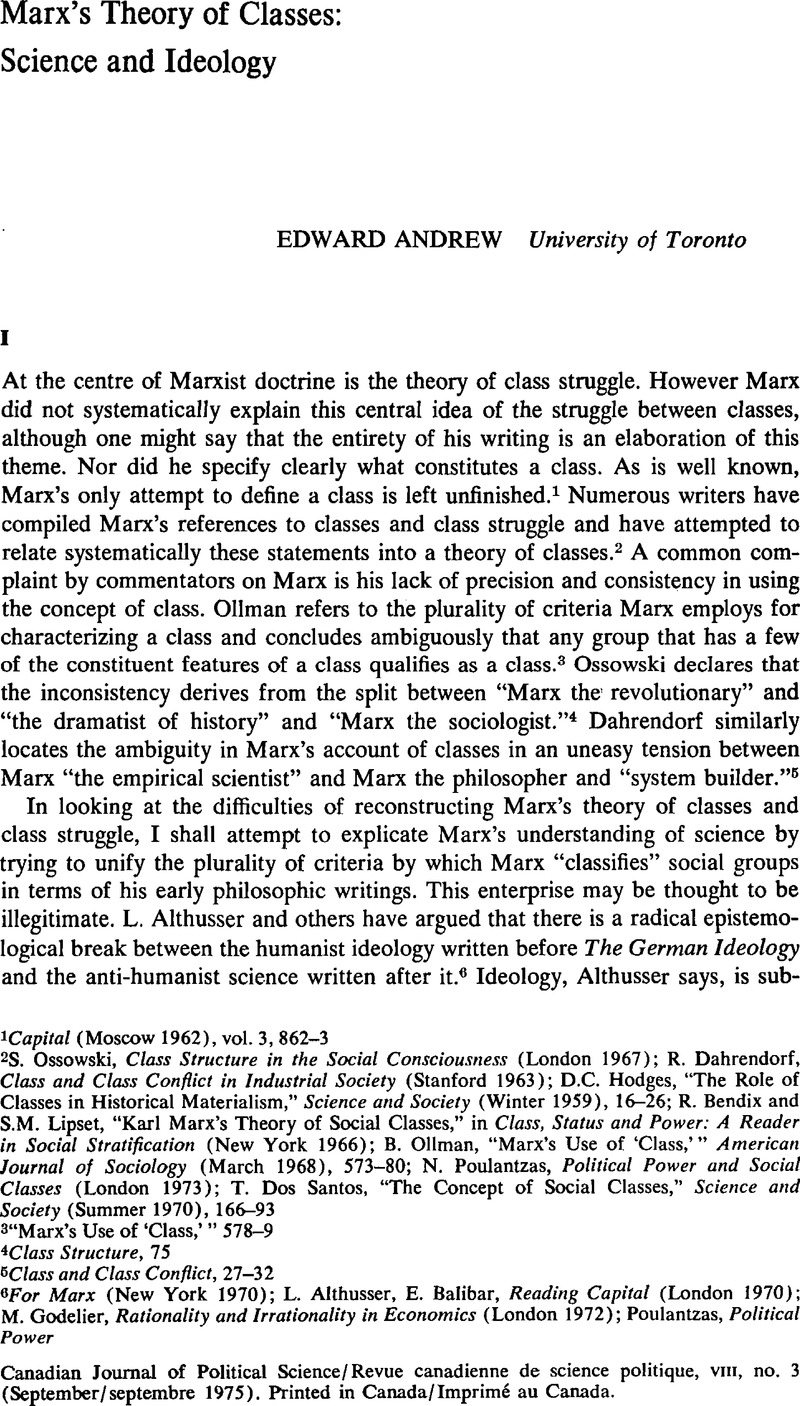Article contents
Marx's Theory of Classes: Science and Ideology
Published online by Cambridge University Press: 10 November 2009
Abstract

- Type
- Articles
- Information
- Canadian Journal of Political Science/Revue canadienne de science politique , Volume 8 , Issue 3 , September 1975 , pp. 454 - 466
- Copyright
- Copyright © Canadian Political Science Association (l'Association canadienne de science politique) and/et la Société québécoise de science politique 1975
References
1 Capital (Moscow 1962), vol. 3, 862–3
2 Ossowski, S., Class Structure in the Social Consciousness (London 1967)Google Scholar; Dahrendorf, R., Class and Class Conflict in Industrial Society (Stanford 1963)Google Scholar; Hodges, D.C., “The Role of Classes in Historical Materialism,” Science and Society (Winter 1959), 16–26Google Scholar; Bendix, R. and Lipset, S.M., “Karl Marx's Theory of Social Classes,” in Class, Status and Power: A Reader in Social Stratification (New York 1966)Google Scholar; Ollman, B., “Marx's Use of ‘Class,’” American Journal of Sociology (March 1968), 573–80Google Scholar; Poulantzas, N., Political Power and Social Classes (London 1973)Google Scholar; Santos, T. Dos, “The Concept of Social Classes,” Science and Society (Summer 1970), 166–93Google Scholar
3 “Marx's Use of ‘Class,’” 578–9
4 Class Structure, 75
5 Class and Class Conflict, 27–32
6 For Marx (New York 1970); Althusser, L., Balibar, E., Reading Capital (London 1970)Google Scholar; Godelier, M., Rationality and Irrationality in Economics (London 1972)Google Scholar; Poulantzas, Political Power
7 For Marx, 234
8 Ibid., 14–15
9 For Marx, 227
10 Political Power, 67
11 See Early Writings, ed. Bottomore, T.B. (New York 1964), 1–31, 120–94.Google Scholar
12 Ibid., 55–9
13 For Marx, 237
14 Ibid., 232–3
15 Ibid., 232
16 See chapters on Alienated Labour, Private Property and Communism, Critique of the Hegelian Dialectic and Philosophy as a Whole, in Early Writings and Theses on Feuerbach.
17 Early Writings, 162–3
18 Althusser, For Marx, 234
19 “Concept of Social Classes,” 190
20 Die moralisierende Kritik and die kritisierende Moral, in Werke Bd. 4 (Berlin 1959), 349
21 Selected Works, in one volume (Moscow 1968), 228–9
22 Critique of the Gotha Programme, in Selected Works, 319
23 Early Writings, 132
24 Marx, and Engels, , Basic Writings on Politics and Philosophy, ed. Feuer, L.S. (New York 1959), 269Google Scholar
25 The German Ideology, 68–9
26 Selected Works, 75
27 Critique of the Gotha Programme in Selected Works, 324
28 See Early Writings, 122–33; Capital, Vol. 3, 800; Grundrisse (London 1973), 611–12.
29 The German Ideology, 31–2
30 Early Writings, 125
31 Ibid., 127
32 The German Ideology, 93; cf. The Poverty of Philosophy, 166–7
33 Liberal thought tends to overlook the existence of classes or else attempts to explain them, in an un-Marxian manner, consistent with the equality of opportunity. See Schumpeter, J., Social Classes (New York 1955)Google Scholar; K. Davis and W.E. Moore, “Some Principles of Social Stratification” in Bendix and Lipset, Class, Status and Power, 47–53.
34 The German Ideology, 69
35 Ibid., 93, Selected Works, 104
36 The German Ideology, 93
37 The Poverty of Philosophy, 166; Selected Works, 43
38 The German Ideology, 78
39 Shanin, T., cited by Hobsbawm, E., “Class Consciousness in History” in Aspects of History and Class Consciousness, ed. Meszaros, I. (London 1971), 9Google Scholar
40 Selected Works, 172
41 The Making of the English Working Class (New York 1963), passim
42 The German Ideology, 77; Selected Works, 42–3
43 Selected Works, 43
44 Selected Works; The Poverty of Philosophy, 120
45 The Poverty of Philosophy, 166
46 Poulantzas, Political Power, 43; Ollman, “Marx's Use of ‘Class,’” 576–80; Hobsbawm, “Class Consciousness,” 5–21
47 Selected Works, 46
48 The Poverty of Philosophy, 59; cf. 116–7, 167
49 See Marx's writings on British imperialism in India and China in Avineri, S., Karl Marx on Colonialism and Modernization (New York 1968).Google Scholar
50 The Marx-Engels Reader, ed. Tucker, R. (New York 1972), 405Google Scholar
51 The Poverty of Philosophy, 167–8
52 Selected Works, 44. On the alleged inconsistency between the two-class model and a multiclass model, see Dahrendorf, Class and Class Conflict; Ossowski, Class Structure; Ollman, “Marx's Use of ‘Class’”
53 The Bonaparte régime was unable to secure the interests of the small peasants that had raised Louis Napoleon to power. The growth of industry during the empire ultimately favoured the industrial capitalists, although the government did not represent their interests.
54 Selected Works, 290
55 However, neither the bourgeoisie nor the proletariat are classes for themselves; their “classness” is restricted by an absence of cohesion and political awareness.
56 Prison Notebooks (New York 1973), 336
- 7
- Cited by


